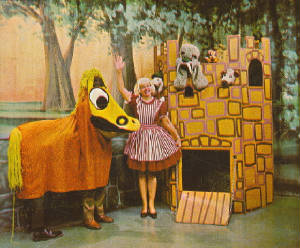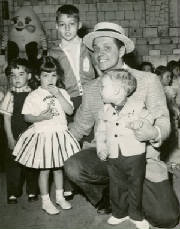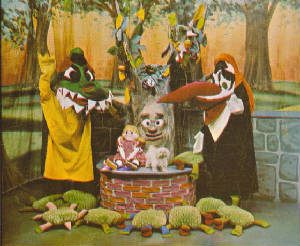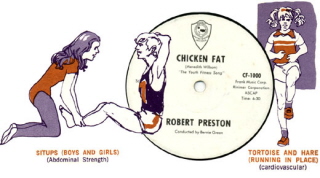|
As the years passed, Luci's Toyshop evolved. We'll try to document those changes here . . .

|
| The expanded set included a castle |
For more than half of the show's twelve-year run, Luci's Toyshop was a thirty-minute program with no studio audience.
These were the quiet, consistant years of the show -- just Luci and the puppets, really -- establishing the traditions that
defined Luci's Toyshop.
However, one-hundred miles south of Columbus, WCPO-TV in Cincinnati had a children's television hit (arguably Ohio's
most popular kid's show EVER) -- The Uncle Al Show. Uncle Al was a live daily 9:00 a.m. blockbuster that
included twenty screaming children -- not just in the studio audience, but right there on the set,
on-camera for the entire show. Not surprisingly, the popularity of The Uncle Al Show -- and the revenues "Al" was
generating in Cincinnati, caught the attention of executives at WBNS. And all that led to the biggest-change-ever in
the history of Luci's Toyshop. Around 1967, Luci's Toyshop expanded to sixty-minutes, and for the first time --
included a studio audience of children.
So, Luci's Toyshop introduced a daily studio audience of around fifteen kids and a new sixty-minute format.
During the first thirty-minutes of the show, the kids were kept pretty quiet and more-or-less off-camera (in a peanut-gallery,
so-to-speak). But during the second half-hour, the kids were given full-reign in the show's expanded new set -- which
included the Toyshop's back-yard -- sometimes referred to as the Enchanted Forest.

|
| Cincinnati's Uncle Al (played by Al Lewis) surrounded by kids |
Unlike Cincinnati's Uncle Al Show -- where the kid-audience stood, danced around, and screamed during
the entire show -- children in the "Toyshop" audience were a little calmer, and encouraged to sit on cushions shaped
like turtles, which were strategically placed around the set.
Some trivia -- The turtle-cushions originated on the show during the early days of the
studio audience -- as a way to provide seating for the kids. But, the turtles were also featured as a plot-point
in the 1969 Luci's Toyshop Coloring-Book (do coloring books have plots??). The turtles also played heavily
in the plot of 1995's Crystal Palace Tribute to Luci's Toyshop.
Turtle-cushions? Who'd have ever thought the turtles would become such a link to Luci's Toyshop history?

|
| Mr. Tree in his new setting -- notice the turtle cushions; to keep the kids quiet and occupied. |
Comments from a fan . . .
“Among Columbus area baby-boomers and Luci fans, there is a feud
going-on. Which was better? The
early years of Luci’s Toyshop; the 30-minute show with no studio-audience? Or the later years; the 60-minute format
with all the kids in the studio?
At dinner a few nights ago, six or seven of us found ourselves once-again discussing
our childhood TV memories. I must be a really old Luci’s Toyshop fan, because
my earliest memories of the show were during the early 1960s. I watched the show
nearly every day, until I started first-grade in autumn of 1965. After that,
I only saw the show during holiday breaks and in the summer. So I, and people
around my age, remember Luci’s Toyshop as being a kid’s show very similar to Captain Kangaroo. Luci interacted quietly with the puppets and often talked directly to the kid’s at home, by speaking
directly into the camera, much like Captain Kangaroo did. We old-fogies always
seem to agree that those were the most memorable years of Luci’s Toyshop.
However, friends just three or four years younger than me don’t even
remember Luci’s Toyshop without the kids in the audience. Their
memories of the show are very different. They take for granted the 60-minutes
daily, and the frenetic group of children on the set. They don’t acknowledge
any similarity between Luci and Captain Kangaroo. They see the two shows as being entirely different. These slightly younger fans compare Luci’s Toyshop to shows like Bozo the Clown and Romper Room. Oh my!
So, I submit that there were two very different eras of Luci’s
Toyshop: 30-minutes with no studio audience, and 60-minutes with twenty yammerin’ youngin’s. Even though our webmasters here may consider the changes/evolutions on Luci’s show to have been minimal,
I will respectfully disagree. The differences between the 30-minute show, and
the 60-minute version were significant.
And by the way, I love this site.
Keep up the good work.”
-- Louise M. Barrett
"Doing the Chicken-Fat" . . .

|
| "Chicken-Fat" was part of the President's Council on Physial Fittness |
The Chicken-Fat song became a part of Luci's Toyshop around 1967, and quickly became a fan-favorite.
The song was written by Meredith Wilson (of "Music Man" fame) and recorded by Robert Preston in approximately 1962.
Commissioned by President John F. Kennedy for his President's Council on Physical Fitness, it has been said that a copy of
the record was distributed to every public school in the U.S., with directions to play the song over the intercom each
morning.
"Good morning! Hands-on-hips -- place. Now then, touch your toes with me, ready -- Touch-down, up
-- down, up . . ."
Luci's fans will remember the kids in the TV audience lying on the floor, doing push-ups, touching their toes, doing
the "bicycle-ride", running in-place, and all sorts of other calisthenics to this tune -- right
along with Luci.
Some may recall that, in addition doing the Chicken-Fat on her daily program, Luci also brought the song (and her entire
TV show) to the Ohio State Fair annually for several years, where hundreds of kids and moms in the outdoor-audience exercised
on live television.
Listen to the Chicken Fat Song
Some smaller, but noticable changes in Luci's show . . .
- Exit of puppet character, Neville the News-Hound – approximately 1961
- Exit of puppet character, Lion – approximately 1962
- Transition from black-and-white to color – exact year unknown, but probably 1966
- Addition of Mr. Tree character – approximately
1967
- Addition of Wonder-Witch and Horace the Horse – approximately
1968
- Changes in the Toyshop set – approximately
1968
- Exit of long-term puppet character, Chan-10 – approximately
1970
|

